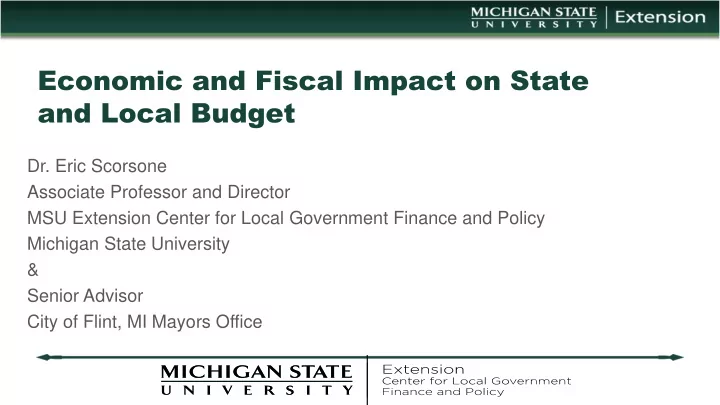

Economic and Fiscal Impact on State and Local Budget Dr. Eric Scorsone Associate Professor and Director MSU Extension Center for Local Government Finance and Policy Michigan State University & Senior Advisor City of Flint, MI Mayors Office
SECTION ONE: ECONOMIC OUTLOOK
Sharpest drop on record
Unemployment , initial claims Sharpest increase on record in initial claims
Lost 700,000 jobs
Unemployment rate climbing
10 year treasury rate lowest in a decade
U r U recession vs. ecession vs. V r V recession ecession • U recession • Longer downturn with a still sharp upturn • Growth in 4 th quarter of 2020 and 1 st quarter of 2021 • V recession • Shorter downturn with a sharp upturn • 3 rd and 4 th quarter of 2020 • Dependent on: • Social distancing rules and virus flows • Consumer and business confidence
Third scenario - A half A half V V and the and then n slo slow r w reco ecover ery • Economic boost happens as personal consumption and business investment pick back up • But some industries are forced to operate half or two thirds capacity for some sustained period of time Slower long term recovery, 18 months of lost growth Spring back period
Forecasting • Dealing with a downturn is always tough, historical data from last few years won’t be of much help • Plus this is a whole set of economic factors that we have never dealt with • Best option is to identify who pays for the taxes and what is the economic impact on their cash flow and balance sheet • Will they pay, will they defer • State govt. • Local businesses and residents
SECTION TWO: STATE BUDGET OUTLOOK
State Budget Challenges • GF/GF • $1 bil. to $1.5 billion shortfall • SAF • $1bil. to $1.5 bill shortfall
Sta State te of of Mic Michigan higan own wn sour source R ce Revenue enues • Individual income tax • $10.5 billion • Unemployment income is taxable • State sales tax • $9.5 billion • Huge decline likely
Federal Government Coronavirus Relief Fund • Michigan provided $3.9 billion in relief funds but only for covid-19 related expenses • Three large counties provide their own separate funds
SECTION THREE: COUNTY BUDGET RISK AND PRESSURES
County Government Revenues • Property tax 50% • Intergovernmental revenue 25% • Fees, charges, fines, etc …. 25% • Let’s take one at a time
County property taxes • Likely won’t be hit initially • Values should be stable for now with assessment cycle • Question whether delinquency rates will rise • Policy question around deferred property tax payments
County intergovernmental revenue • Revenue sharing • Based on state income and sales tax; 50% cut in April and May • Some proportionate cut likely coming • Local community stabilization act money • Based on use tax – set in statute • Some “excess” funding may be lost • Other state funds • Health • Corrections • environment
County charges, fines and fees • District and circuit court costs and fees • County clerk fees and costs • Register of deeds • Real estate transfer tax, record copying, recording fees • All of these may see some hit depending on how you structure operations and how quickly the economy gets back online
County Covid-19 Expense Reimbursement • FEMA • Department of Justice • CDBG, FQHC, housing/homelessness, election security • CARES act • $3.1 billion to the state • Costs incurred between March 1 and Dec 30, 2020 • Currently does not account for lost revenue; expenses related to Covid-19 only • Medical costs, public health expenses, medical related payroll expenses, unemployment, small business support,
County Fund Balances (FY 2012 and FY 2018) FY 2012 FY 2018 Average 22.9% Average 33.7% Median 19.4% Median 31.3% Variance 16.8% Variance 18.7% Maximum 70.6% Maximum 89.9% Minimum -21.6% Minimum 2.4%
County Financial Leadership • County leaders have used the stronger economic trends in the last 6-7 years to invest in services and infrastructure and rebuild reserves • Leadership is needed now more than ever to balance the needs to maintain financial health and maintain critical public services
Strategies and Management • Typical strategy • Hiring and spending freeze, training and travel freeze • Timeframe • How long will the risk last • Risk profile • There are significant economic risks, but reducing services and cutting employees also entails risks • Financial resilience • Fund balance, open positions, professional services and supplies
• Thank you! • Questions? • Dr. Eric Scorsone • scorsone@msu.edu
Recommend
More recommend